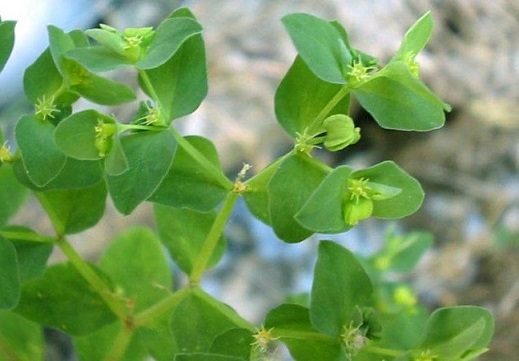Phytochemicals From Euphorbia Peplus Enhances Autophagic Flux and Aids in the Treatment of Neurodegenerative Diseases
Nikhil Prasad Fact checked by:Thailand Medical News Team Jan 02, 2025 3 months, 1 week, 4 days, 12 hours, 35 minutes ago
Medical News: A Traditional Plant Meets Cutting-Edge Science
The field of neurodegenerative disease research has taken a promising turn with the discovery of compounds from the plant Euphorbia peplus, long used in traditional medicine. This unassuming plant, originally native to the Mediterranean region and now found globally, has been the subject of rigorous scientific exploration. Researchers from the State Key Laboratory of Functions and Applications of Medicinal Plants at Guizhou Medical University, the Kunming Institute of Botany at the Chinese Academy of Sciences, and Lanzhou University collaborated on this groundbreaking study.
 Phytochemicals From Euphorbia Peplus Enhances Autophagic Flux and Aids in the Treatment of
Phytochemicals From Euphorbia Peplus Enhances Autophagic Flux and Aids in the Treatment of
Neurodegenerative Diseases
The findings have brought attention to specific diterpenoid compounds extracted from Euphorbia peplus. These compounds, which include novel jatrophane and lathyrane types, exhibit significant potential in enhancing autophagic flux—a crucial cellular process. This
Medical News report delves into the key findings and their implications for medical science.
What Are Autophagic Flux and Its Importance
Autophagic flux refers to the dynamic process by which cells remove damaged components and recycle essential cellular materials. This process is vital for maintaining cellular health and has been implicated in the prevention of various neurodegenerative diseases, including Alzheimer’s. Impairments in autophagic flux are often associated with the accumulation of toxic proteins, a hallmark of diseases such as Alzheimer’s and Parkinson’s.
Recent research has emphasized the potential of pharmacological agents to enhance autophagy, paving the way for therapeutic strategies. Euphorbia peplus compounds appear to fit this role perfectly, providing a natural source for autophagy inducers.
Study Highlights and Findings
The research team isolated four new jatrophane-type diterpenoids (euphjatrophanes H–L) and one new lathyrane-type diterpenoid, along with eight previously known diterpenoids. Using advanced techniques such as NMR spectroscopy, X-ray crystallography, and electronic circular dichroism analysis, the structures of these compounds were meticulously identified.
Key Highlights Include:
-Autophagic Flux Activation: Compounds 1 (euphjatrophane H) and 12 demonstrated particularly high efficacy in increasing autophagic flux. This was confirmed through flow cytometry analysis using specialized HM mCherry-GFP-LC3 cells, which can visually and quantitatively track autophagic activity.
-Blood–Brain Barrier (BBB) Permeability: The permeability of compounds across the BBB is a critical factor for treating neurodegenerative diseases. Both compounds 1 and 12 exhibited excellent permeability in the PAMPA-BBB assay, with logPe values of −4.853 and &mi
nus;5.017, respectively. These values indicate a strong potential for crossing the BBB and exerting therapeutic effects in the brain.
-Structure - Activity Relationships: Detailed analysis revealed that certain structural features, such as the presence of benzoyl and isobutyryl groups, enhanced the autophagic activity of these compounds. For instance, compound 1’s unique combination of acetyl, benzoyl, and hydroxyl groups was linked to its superior performance.
Potential Applications for Neurodegenerative Diseases
Neurodegenerative diseases like Alzheimer’s are characterized by the accumulation of toxic proteins such as amyloid-beta plaques in the brain. Enhancing autophagic flux can help clear these harmful substances. The promising activity of compounds 1 and 12 in this context suggests they could serve as lead molecules for developing new drugs targeting these conditions.
This study underscores the importance of natural products as a rich source of therapeutic agents. The diterpenoids derived from Euphorbia peplus not only enhance autophagic flux but also demonstrate the ability to cross the BBB, a significant challenge in drug development for neurological disorders.
Broader Implications for Drug Discovery
The findings also highlight the structural diversity of diterpenoids as a chemical class. The flexibility and variability of these compounds offer numerous opportunities for chemical modification and optimization. By understanding the structure - activity relationships, researchers can further refine these compounds to enhance their efficacy and safety.
Moreover, the use of advanced analytical techniques like single-crystal X-ray diffraction and electronic circular dichroism has set a high standard for natural product research. Such methods ensure precise identification and characterization, critical for subsequent drug development.
Conclusion
The research on Euphorbia peplus has opened new avenues for the treatment of neurodegenerative diseases. The discovery of novel diterpenoids with potent autophagic flux-enhancing properties marks a significant step forward. Compounds 1 and 12, in particular, stand out as promising candidates for further development.
Looking ahead, clinical trials will be essential to determine the safety and efficacy of these compounds in humans. If successful, these natural products could revolutionize the management of neurodegenerative diseases, offering hope to millions worldwide.
The study findings were published in the peer-reviewed International Journal of Molecular Sciences.
https://www.mdpi.com/1422-0067/26/1/299
For the latest on Herbs and Phytochemicals, keep on logging to Thailand
Medical News.
Read Also:
https://www.thailandmedical.news/news/thailand-medical-researchers-explore-the-use-of-kratom-to-treat-alzheimer-s-disease
https://www.thailandmedical.news/news/thailand-medical-study-involving-ginger-phytochemicals-could-transform-neurodegenerative-disease-treatments
https://www.thailandmedical.news/news/forget-about-tetrahydrocannabinol-thc-and-cannabidiol-cbd-modern-medicine-more-interested-in-cannabigerol-cbg
https://www.thailandmedical.news/news/thailand-medical-researchers-find-that-huperzine-a-from-huperzia-serrata-moss-can-help-combat-alzheimer-s-disease
https://www.thailandmedical.news/articles/alzheimer,-dementia-
https://www.thailandmedical.news/articles/herbs-and-phytochemicals
